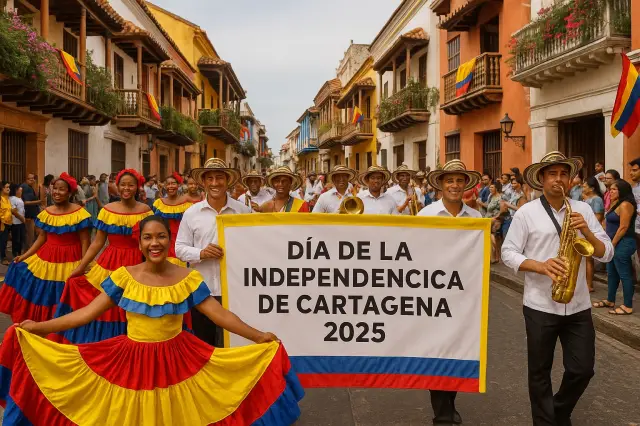Cartagena's Independence Day is one of the most important dates in Colombian history. Every November 11th , the people of Cartagena proudly celebrate the day in 1811 when the city became the first in the country to declare its absolute independence from Spain. In 2025, this commemoration takes on a special significance, continuing to reaffirm the libertarian spirit and cultural richness of the Colombian Caribbean.
Origin of Cartagena's Independence Day
At the beginning of the 19th century, the ideas of freedom and sovereignty spread throughout Latin America. In Cartagena, a city prosperous due to its port and trade, there was an atmosphere of political tension between supporters of Spanish rule and those seeking independence.
On November 11, 1811 , after intense debates in the Cabildo and pressure from the people gathered in front of the Government Palace, local leaders signed the Act of Absolute Independence , definitively breaking ties with the Spanish monarchy. Thus, Cartagena became the first free province of Colombia , setting a precedent for the rest of the country.
Cartagena, pioneer of independence in Colombia
Cartagena's independence was not just a political act, but a symbol of the power of the people. The participation of diverse social sectors, including artisans, merchants, freed slaves, and Creoles, demonstrated the collective spirit that characterized this process.
This fact inspired other regions of the Viceroyalty of New Granada to follow the same path, driving the process of national independence that would culminate in 1819 with the victory in the Battle of Boyacá .
How Cartagena's Independence Day is celebrated in 2025
In 2025, the walled city prepares for a week filled with color, music, and national pride. The celebrations begin in early November and reach their peak on November 11th , with the traditional Independence Parade , featuring comparsas, schools, bands, and folk groups.
Some of the most anticipated events of the 2025 Cartagena Independence Festival include:
Independence Proclamation , with the opening speech that officially begins the festivities.
Parade of troupes and floats , an explosion of culture, dance and popular creativity.
Popular beauty pageant , which selects the Queen of Independence, representing the neighborhoods of Cartagena.
Cultural and artistic activities , with gastronomic samples, concerts and exhibitions.
These celebrations not only commemorate a historical event, but also strengthen the cultural identity and sense of belonging of the people of Cartagena.
Historical and cultural significance
Cartagena's Independence Day represents the courage of a people who dared to fight for their freedom, even before a unified Colombian nation existed. Therefore, each year this date is associated with concepts such as resistance, pride, and sovereignty .
In addition, the event serves to rescue the historical memory of local heroes and heroines such as:
José María García de Toledo , political leader of the independence.
Pedro Romero , a mulatto artisan who led the popular rebellion known as the Lancers of Gethsemane .
Doña María de la Concepción Lizarazo , one of the women who supported the liberation cause from hiding.
Tourism and economic impact
During November, Cartagena welcomes thousands of national and international visitors attracted by the festivities, warm weather, and festive atmosphere. Hotels, restaurants, and travel agencies experience one of their busiest times of the year.
In addition to the commemorative events, visitors can enjoy historical tours of:
The San Felipe de Barajas Castle
The Caribbean Naval Museum
The Car Square
The Getsemaní neighborhood , epicenter of popular fervor during the independence
This tourism movement contributes to local economic development and strengthens the city's international projection as a cultural and historical destination .
The legacy of 1811 in contemporary Cartagena
More than two centuries later, the spirit of 1811 lives on. New generations of Cartagena residents celebrate independence with pride, but also reflect on the current challenges of freedom, equality, and social justice.
The 2025 commemoration invites us to remember that independence was not just a past event, but a constantly evolving process that continues to define Colombia's identity.
